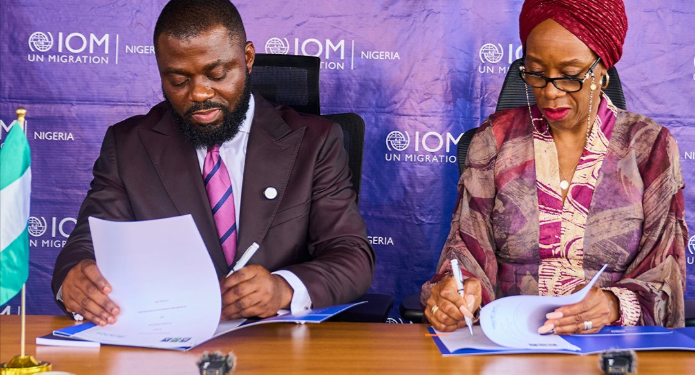The Bank of Agriculture (BOA) has entered into a $200 million partnership with the International Organization for Migration (IOM) to enhance economic resilience and provide sustainable livelihoods for displaced persons and migrants across Nigeria.
The agreement, sealed through a Memorandum of Understanding signed in Abuja, is aimed at promoting economic inclusion among vulnerable populations.
It was formalized by IOM’s Deputy Director General for Operations, Ugochi Daniels, and BOA’s Managing Director and Chief Executive Officer, Ayo Sotinrin.
Speaking at the event, Sotinrin described the partnership as “an investment in people and national stability,” noting that it represents more than financial aid. “We view this fund as a crucial step in transforming the landscape of rural poverty.
It unlocks productivity through people-centred investment that enables the economic inclusion of migrants and positions displaced Nigerians as contributors to rural development and national economic stability under the Renewed Hope Agenda,” he said.
The collaboration is designed to tackle displacement, food insecurity, and rural poverty by empowering affected populations to rebuild their livelihoods.
It aligns with Nigeria’s national development agenda and the African Union’s Agenda 2063, both of which emphasize resilience, self-reliance, and inclusive growth.
Daniels noted that the initiative underscores a shared commitment to finding long-term solutions for migrants and communities impacted by displacement.
“By linking migration management with development financing, we can create inclusive economic opportunities that empower people to rebuild their lives, contribute to local economies, and reduce aid dependency,” she said.
Nigeria currently hosts over 3.5 million internally displaced persons (IDPs) who have lost access to land, income, and productive assets due to conflict, climate shocks, and economic disruptions.
The BOA–IOM initiative aims to close critical livelihood gaps through community-driven interventions such as access to agricultural inputs, capacity building, financial inclusion, and market linkages.
Both organizations emphasized that the fund complements national strategies and aligns with the United Nations Sustainable Development Cooperation Framework (UNSDCF).
It is also expected to serve as a model for migration-sensitive development financing across Africa, advancing shared goals of stability and resilience in displacement-affected regions.
This development comes just five weeks after BOA secured a $1 billion intervention fund from the African Export-Import Bank (Afreximbank) to support smallholder farmers and strengthen the agricultural value chain from production to market access.
The initiative aligns with President Bola Tinubu’s approval of the National Food Security Fund, a revolving matching fund developed in collaboration with state governments to boost food production and ensure inclusive economic growth.










